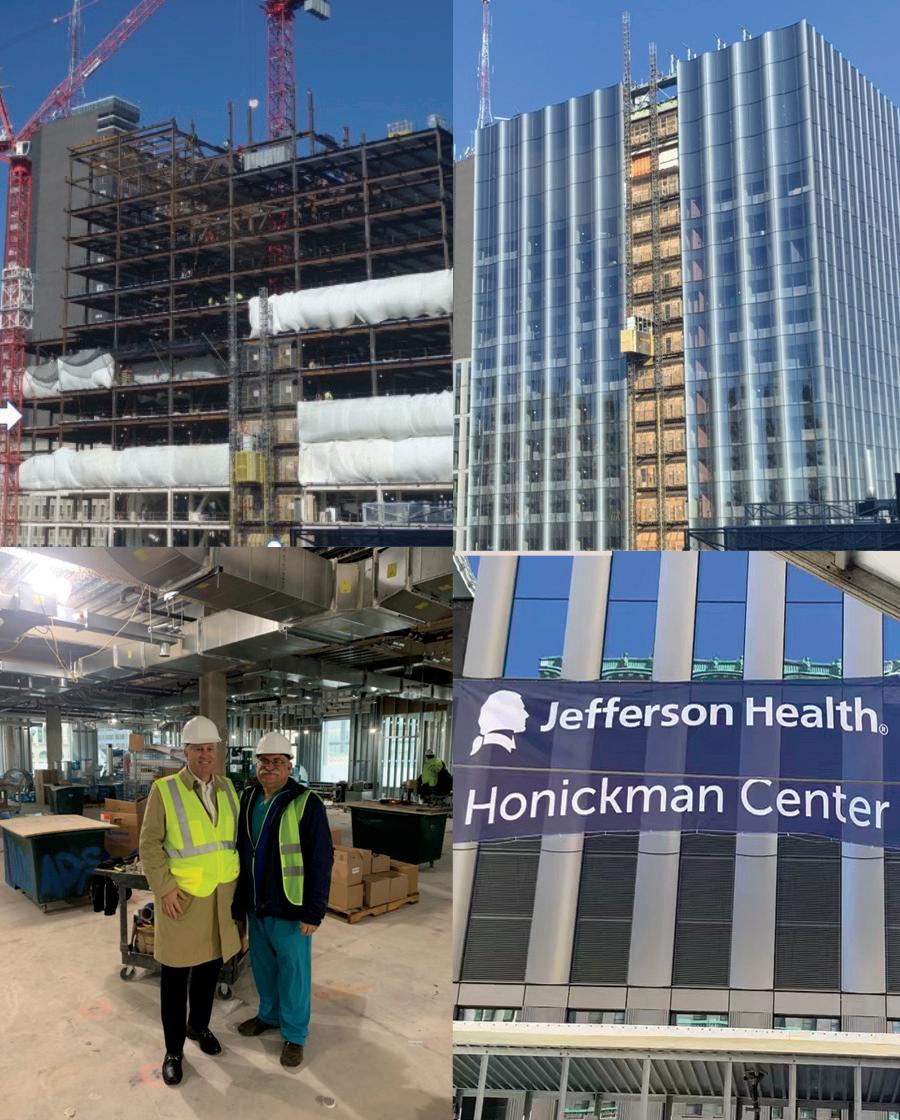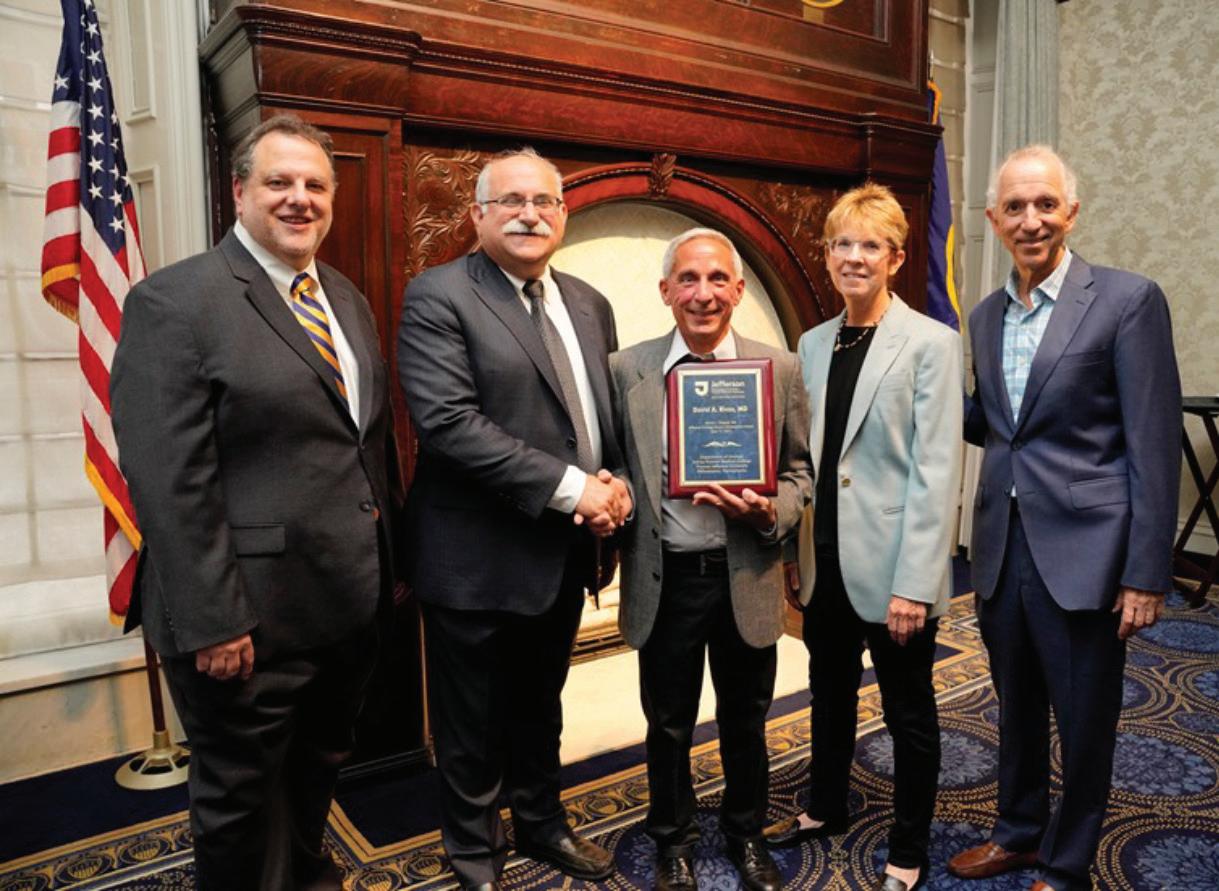
9 minute read
Jefferson’s Urology
David Melvin Davis, MD, a recognized figure in what was then modern urology and the fourth Chairman of Jefferson’s Department of Urology, officially established the Thomas Jefferson University Urology Residency Training Program in 1946 (originally called the Jefferson Medical College Hospital program). That was 42 years after Jefferson’s Department of Urology was founded in 1904, making it one of the oldest urology departments in the United States and the oldest on the East Coast.
Jefferson’s residency program quickly evolved to reflect changes in urology. Many physicians in the specialty were trained in genitourinary surgery in the early 1900s, but soon after Dr. Davis’s appointment at Jefferson in 1935, the Department of Genito-Urinary Diseases at Jefferson changed its name to the Department of Urology. And in 1948, thanks to an arrangement with Jefferson’s Professor of Surgery, John H. Gibbon, MD, residents would receive a year of training in general surgery before beginning three years in urology. Fast forward to today, the residency program has 145 graduates, with many having continued their academic ties to Jefferson’s Department of Urology.
“Jefferson’s residency program, which went from a six-year residency to a five-year program in 2018, is widely recognized as providing urology residents with broad but deep training in surgical urology, preparing those who emerge from the residency with the expertise needed to be fully trained urologic surgeons,” said Residency Program Director and Professor of Urology Patrick J. Shenot, MD.

Dr. Shenot, a Thomas Jefferson Urology Resident (class of 1997) and today’s deputy chair in the Department of Urology, has directed the Urology Residency Training Program at Jefferson since 2002.
Like in previous decades, the program has evolved to reflect changes in the specialty. Today’s urology residents gain experience in the newest technologies, like robotic surgery and some of the more advanced endoscopic surgeries.
David M. Davis, MD, began the first urology residency program at Jefferson in 1946.
As further validation of the program’s quality, Doximity, the largest community of healthcare professionals in the United States, has ranked the Urology Residency Training Program at the Sidney Kimmel Medical College at Thomas Jefferson University as 18th among 147 U.S. listed urology residency programs.
U.S. News & World Report has ranked Jefferson Urology among their top urology departments in the nation. Currently, Jefferson is ranked #36 among 1490 programs for urologic care, according to the 2022 U.S. News Best Hospitals rankings. The Sidney Kimmel Cancer Center at Jefferson Health is distinguished in the U.S. News rankings among the top U.S. cancer centers, including classification as a National Cancer Institute (NCI)-designated center.
A LOOK THROUGHOUT THE DECADES
The Urology Residency Training Program has grown considerably in the last 10 years.
Prior to 2014, the program accepted two residents a year. The residency program’s growth has paralleled the department’s expansion. Throughout the ’50s, ’60s, and ’70s, Jefferson’s Urology Department employed one or two full-time academic urologists with the rest of the faculty being in private practice.
The Department’s seventh chair, S. Grant Mulholland, MD, appointed from 1977 to 2002, changed that. Early on when Dr. Mulholland was chair, the department had three talented urologists, but all were volunteer faculty with large community practices. The Department of Urology needed academic modernization, including an expanded research capacity. So, Dr. Mulholland used his time as chair to build a larger, more diversified department offering both primary and tertiary urologic care. He established a urologic research initiative, and by the end of Dr. Mulholland’s tenure as chair, the Department of Urology had 77 employees, including 14 attending physicians, eight residents, two PhDs, and several clinical fellows and post-docs. Residents now had the benefit of dedicated research experience.
Under the leadership of the present Chair, Leonard G. Gomella, MD, the urology residency expanded from two to three trainees a year with an increasing number of residency program graduates going onto prestigious fellowships, academic positions, and top-rated practices around the United States.
Today’s Jefferson Department of Urology has 18 faculty members, including general urologists and fellowship-trained urologists, who represent the full spectrum of urologic subspecialties. Two PhD faculty members are focused on education and basic science research. Four pediatric urologists at A.I. duPont Hospital for Children make up the Division of Pediatric Urology. Today’s department includes nationally and internationally recognized faculty in endourology, laparoscopy, urologic oncology, neuro-urology, female urology, andrology and pediatric urology. Faculty members have held leadership positions in numerous organizations, such as the Society of Urologic oncology, the Mid-Atlantic AUA, Philadelphia Urologic Society and others. See page 72 of this 2022 Year in Review to learn about our current faculty members.
Jefferson urology residents experience six months of preliminary general surgery at Thomas Jefferson University Hospital, including exposure to a wide array of surgical disciplines. Residents also experience a variety of practice settings, including inpatient and outpatient care in an academic medical center, a community hospital, and a freestanding children’s hospital. Since the FY23 academic year, residents will have the opportunity to work once again at our affiliated VA hospital in Wilmington, Delaware, as the urology service there expands.
Today’s residents have access to and fully participate in these areas of clinical care during their training: four minimally invasive surgical suites for robotic laparoscopic

Historic snapshot of Philadelphia Urology residencies published in 1949. Note the monthly stipends from 25 to 70 dollars per month.


An example of our commitment to residency training. Soon after the Da Vinci robotic surgical system was put in use in the early 2000’s, our trainees were given the opportunity to work on the earliest simulation systems.
Dr. Patrick Shenot has been Jefferson Urology Residency program director since 2002.
surgery with dual consoles; dedicated endourology suites with full standard and digital imaging capabilities; a full complement of lasers; and dedicated outpatient video urodynamics facilities. Residents have the opportunity to participate in the weekly Genitourinary Multidisciplinary Cancer Clinic at the Sidney Kimmel Cancer Center.
The Jefferson residency features a comprehensive conference and grand rounds schedule, and research exposure with a full-time research faculty member allowing residents to have an exposure to basic science, translational research, and clinical trials. The Department’s trainees have always been given the opportunity to participate in the latest surgical advances. Soon after the DaVinci robot surgical system came to Thomas Jefferson University Hospital, for example, trainees were given the opportunity to work with the earliest simulators and then gain real handson OR experience since the technology’s earliest days. Today, residents have access to the Dr. and Mrs. Robert D. Rector University Clinical Skills & Simulation Center located in the Hamilton Building on campus. Surgical simulators are available for laparoscopic and robotic surgery skill development. It also features the TURP Mentor Surgical Simulation System allowing Jefferson residents to experience and become proficient at an array of endoscopic surgical procedures. This advanced surgical training system is a gift of Jefferson residency alumnus Dr. David Rivas and his wife, Joyce.
According to long-time residency program director Dr. Pat Shenot, “Our residency program was established just after World War II and has always adapted to the changing needs of our trainees for the last 77 years. Our program is committed to having an outstanding training experience for our residents. We will continue to respond to changes to our surgical specialty, and ensure current and future urology graduates can practice as stateof-the-art, caring clinicians.”

TJUH UROLOGY RESIDENTS 1948 -1976
1948 Emanuel N. Lubin, MD 1949 T. Burton Smith, MD 1950 Willard M. Drake, Jr., MD 1951 J. Elder Bryan, Jr., MD 1952 William A. Morton, Jr., MD Donald H. Munroe, MD 1953 Nicholas R. Varano, MD 1954 Joseph J. Blanch, MD 1955 Kenneth C. Warren, MD 1956 Eugene S. Felderman, MD 1957 James J. Gallagher, MD George Eptimiades, MD 1958 James F. Carroll, MD 1959 Murray H. Kimmel, MD Bradford M. McCuskey, MD 1960 Robert N. Cottone, MD 1961 Jose Amado Perez, MD 1962 Paul D. Zimskind, MD, PhD Jose R. Yunen, MD 1963 Francis F. Bartone, MD 1964 Alan I. Snyder, MD Max M. Koppel, MD 1965 Donald Comiter, MD Jean Pacquet, MD 1966 Donald E. Praiss, MD 1967 Louis L. Keeler, Jr., MD George N. Riffle, MD 1968 Leonard A. Frank, MD William D. Ziegenfus, MD 1969 Jorge M. Gonzales, MD 1970 Robert T. Berwind, MD, PhD Jacques De Caestecker, MD 1971 Lawrence N. Gorab, MD Bhupendra Tolia, MD 1972 Terren M. Himelfarb, MD Malcolm P. Scott, MD 1973 Thomas DeBenedictis, MD David A. Kelsy, MD 1974 Michael J. Ginieczki, MD Harvey A. Mannes, MD 1975 Stuart L. Brodsky ,MD Jay J. Handler, MD 1976 P. Kenneth Brownstein, MD Kasturi Shanker, MD
UROLOGY RESIDENTS 1977 -2002
1977 John R. Dalton, MD Sanford Fitzig, MD 1978 Suhas P. Mujumdar, MD William M. Wixted, MD 1979 Krishna K. Jhaveri, MD Pradeep K. Pandya, MD 1980 Vijay S. Athani, MD Doanh Pham, MD 1981 Joseph D. Conti, MD Girdhari S. Purohit, MD 1982 Michael S. Goodman, MD Shaukat M. Qureshi, MD 1983 Nathan P. Goldin, MD Michael P. Mooreville, MD 1984 Michael W. Bickerton, MD Frank L. D’Elia, MD 1985 Haynes B. Cates, MD James Squadrito, Jr, MD 1986 Thomas P. Lehman, MD Kenneth M. Weisman, MD 1987 David J. Ellis, MD Michael H. Rittenberg, MD 1988 Peter J. Muench, MD A. Randall Seeger, MD 1989 Richard E. Landau, MD Stephen R. Walker, MD 1990 James E. Allen, MD Daniel J. Cole, MD 1991 David A. Rivas, MD James L. Stefanelli, MD 1992 Michael Grasso, III, MD Richard G. Nord, MD 1993 David E. McGinnis, MD Jonathan L. White, MD 1994 Deborah A. Kulp-Hugues, MD Stephen E. Strup, MD 1995 Michael J. Erhard, MD Jose G. Moreno, MD 1996 Stuart N. Liberman, MD Francis X. Keeley, MD 1997 Akhil Das, MD Patrick. J. Shenot, MD 1998 Michael Fabrizio, MD Allen Chiura, MD 1999 Robert Hong, MD Kenneth Fitzpatrick, MD 2000 Matt Soroush, MD Ravi Rajan, MD 2001 Edouard Trabulsi, MD David Lee, MD 2002 Pasquale Casale, MD M. Louis Moy, MD
TJUH UROLOGY RESIDENTS 2003-2023
2003 John Oh, MD Jay Zink, MD 2004 Mohammed Ismail, MD Frank Nezu, MD 2005 Scott Hubosky, MD Cristopher Garlitz, MD 2006 Ilia Zeltser, MD Mark Chang, MD 2007 J. Robert Ramey, MD William Merriam, MD 2008 Ilan Waldman, MD Craig Slotoroff, MD 2009 Paul Gittens, MD Eric Nelson, MD 2010 Robert Linden, MD Mark Pe, MD 2011 James Johannes, MD Jitesh Patel, MD 2012 Steve Dong, MD Joseph R. (JR) Zola, MD 2013 Daniel Sackett, MD Adeep B. Thumar, MD 2014 Chandan R. Kundavaram, MD Xiaolong S. Liu, MD Francisco Gelpi-Hammerschmidt, MD 2015 Douglas C. Kelly, MD Arjun Khosla, MD J. Ryan Mark, MD 2016 Michael Amirian, MD Ryan C. Cleary, MD Nathan Roberts, MD 2017 Patricia Zahner, MD Amar Raval, MD Kymora Scotland, MD, PhD 2018 Lawrence M. Lee, MD Andrew C. Margules, MD Whitney Smith, MD 2019 Andrew Pridjian, MD Mihir Shah, MD James Steward, MD 2020 Tomy Perez, MD Ali Syed, MD Hong Truong, MD 2021 Christopher Caputo, MD MayJean (MJ) Counsilman, MD Thomas Hardacker, MD, MBA 2022 Benjamin Rudnick, MD Victor Kucherov, MD Alexander Uhr, MD 2023 Edward Kloniecke, MD, MHA Andrew Salib, MD Anthony Tokarski, MD










